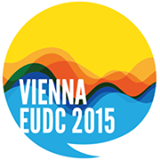Wien plant die EUDC: Stefan Zweikers Rückschau auf 2013
Der Debattierklub Wien, Ausrichter der Europameisterschaften 2015, hat auf seiner Webseite zum Jahresbeginn eine Rückschau auf 2013 veröffentlicht. In dem Artikel berichtet Cheforganisator Stefan Zweiker unter dem Titel „2013 Retrospect – The Starting Position for 2014“, was die Wiener in den vergangenen Monaten unternommen haben, um ein erfolgreiches Turnier zu planen. Der Artikel, so betont er zu Beginn, sei bereits vor den Weltmeisterschaften in Chennai entstanden und spiele nicht darauf an. Bei den Weltmeisterschaften hatte es diverse organisatorische Probleme gegeben.
Die Achte Minute veröffentlicht Auszüge aus Stefans Text. Der vollständige Artikel findet sich auf der Webseite der European Universities Debating Championship (EUDC) 2015.
 „What has happened in the past months?
„What has happened in the past months?
First, we focussed on getting accommodation sorted. Accommodation is the most expensive item in our budget. […] Just recently we finalised the contracts with two hotels, which as we think, offered us the best guarantee that Vienna EUDC would be a success. As promised, both of them are right next to the Campus WU.
Second, we tried to dive right into the agenda and arranged meetings with various (potential) stakeholders. Yet, this did not necessarily work out in a way I had suspected it. Vienna EUDC is simply too big of a project to try to start ticking off all the boxes at once. Indeed, we recognised pretty soon that we did not even have a full overview of all the tasks ahead. Matthias [Moser, Anm.d.Red.] (check out his profile on the crew page) was the one who rightly pointed out that the thing we would need the most is project management. So basically a plan for the plan. That was our second focus in the past few months. […]
Third, at this point I need to thank Jakob [Reiter, Anm.d.Red.] for already opening the funding battleground. The quality of Vienna EUDC will vastly depend on how much funds we will be able to raise through private and public sponsorship. Naturally, we did not wait with approaching potential sponsors. On the private front, we noticed that Vienna EUDC is indeed attractive enough as a project to get us answers and interest from certain firms. On the other hand of course, we already encountered the cold feeling of rejection with some of the attempts. I guess this is just how the game works.
On the public funding front I am grateful to Gwen [Eberhart, Anm.d.Red.] for exploring our funding options from the European Union. She made the effort of reading through the lengthy documents and guidelines and even called Brussels. As a result, we now have a solid base to start writing our first funding application in January. Of course our success is uncertain as of now, but let’s hope for the best.
What was good?
[…] Most importantly, I am very happy with our team work. We managed to meet up almost every week and these meetings were very productive. Even when times would be stressful, emails would be responded quickly and deadlines were kept. Also, and this kind of underpins the DKWien spirit, everyone on the team shows great initiative. I would like to take Roman [Korecky, Anm.d.Red.] as an example, who managed to get us approved with Microsoft as an educational institution. The software package we got eases our communication and will make it easier to spread debate far beyond Vienna EUDC.
Besides that, and I believe this is more a DKWien than a Vienna EUDC thing, we should see the good things that Vienna EUDC already does for debating in Vienna and Austria. The project gives us a vision to work for. This correlates with the fact that we can now see more people turn up to our debates than ever. Never before did we have so many freshers at DKWien, and never before did we manage to draw so many people to our public debates and events. […]
What are we working to improve?
Wherever there is serious work done, there are things that go wrong, or that need to be improved. Certainly so we have a few ‘construction sites’ at Vienna EUDC, namely things we imagined would be a lot easier than they actually turned out to be. However, this is where we notice how important the 2-year bid is for this project. Most of the problems we encountered so far developed because things did not run as fast and easy as we expected them to. Examples include dealings with public officials on the one hand and universities on the other. When organising a project of the scale of Vienna EUDC, Austria presents itself from the bureaucratic side, where the mills grind a little bit more slowly than in many other places. Luckily though, these problems, while they are time-consuming, are manageable. We try to convert them into a benefit: The more communication we need with our partners the better we can integrate them into the project and the better we know the structures when the tournament starts. […]
Conclusion
You know what I am happy of not having done in this article? I didn’t tease you about all the great ideas we are having to make Vienna EUDC even greater than what you would have expected. That would have been really unfair of course, because they still remain top secret. Anyway, for now you know that Vienna EUDC 2015 is on track, things are going quite well here. Have a happy new year and be assured: 2014 is one year closer to 2015 already and that’s already something to look forward to!“
kem





